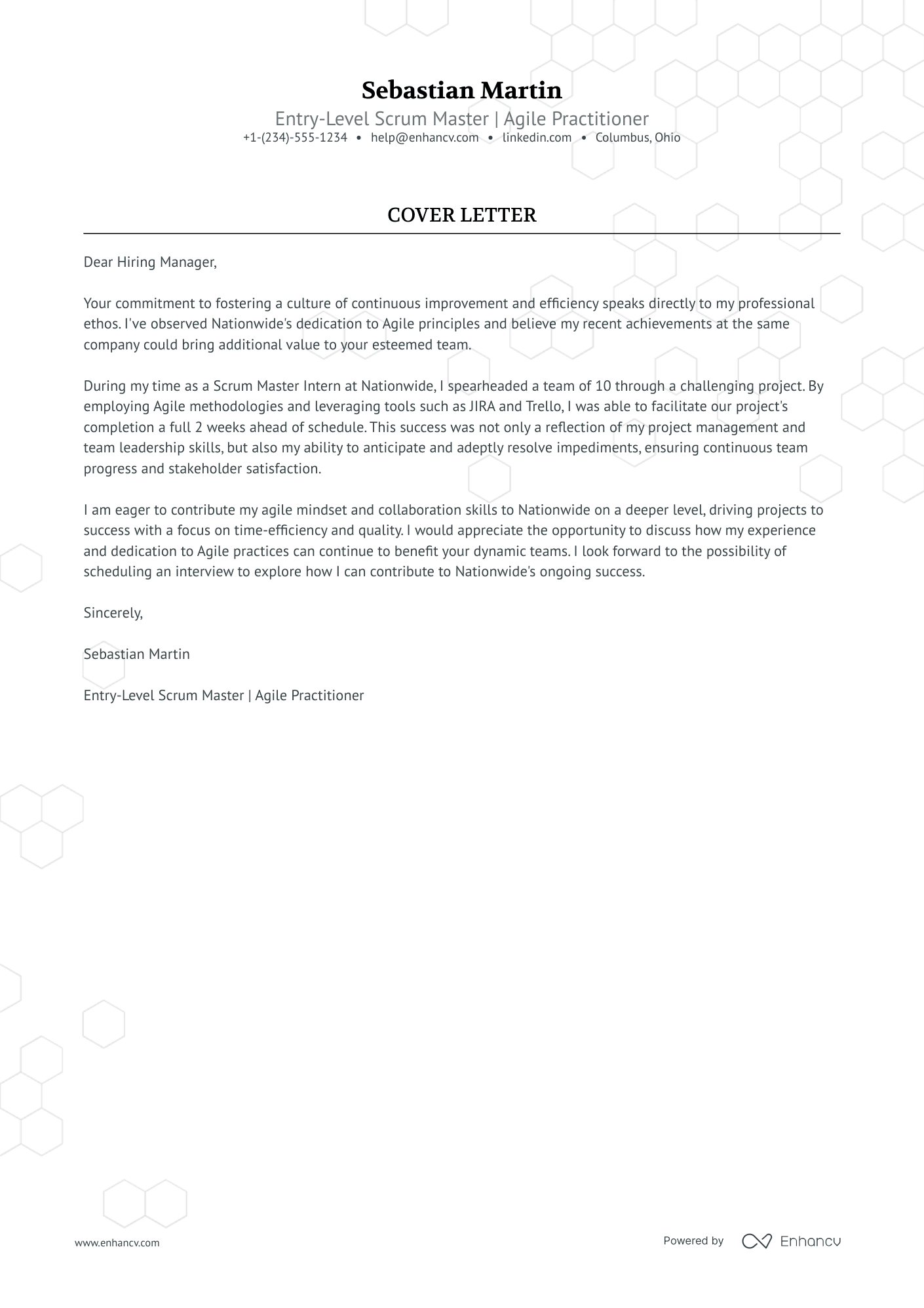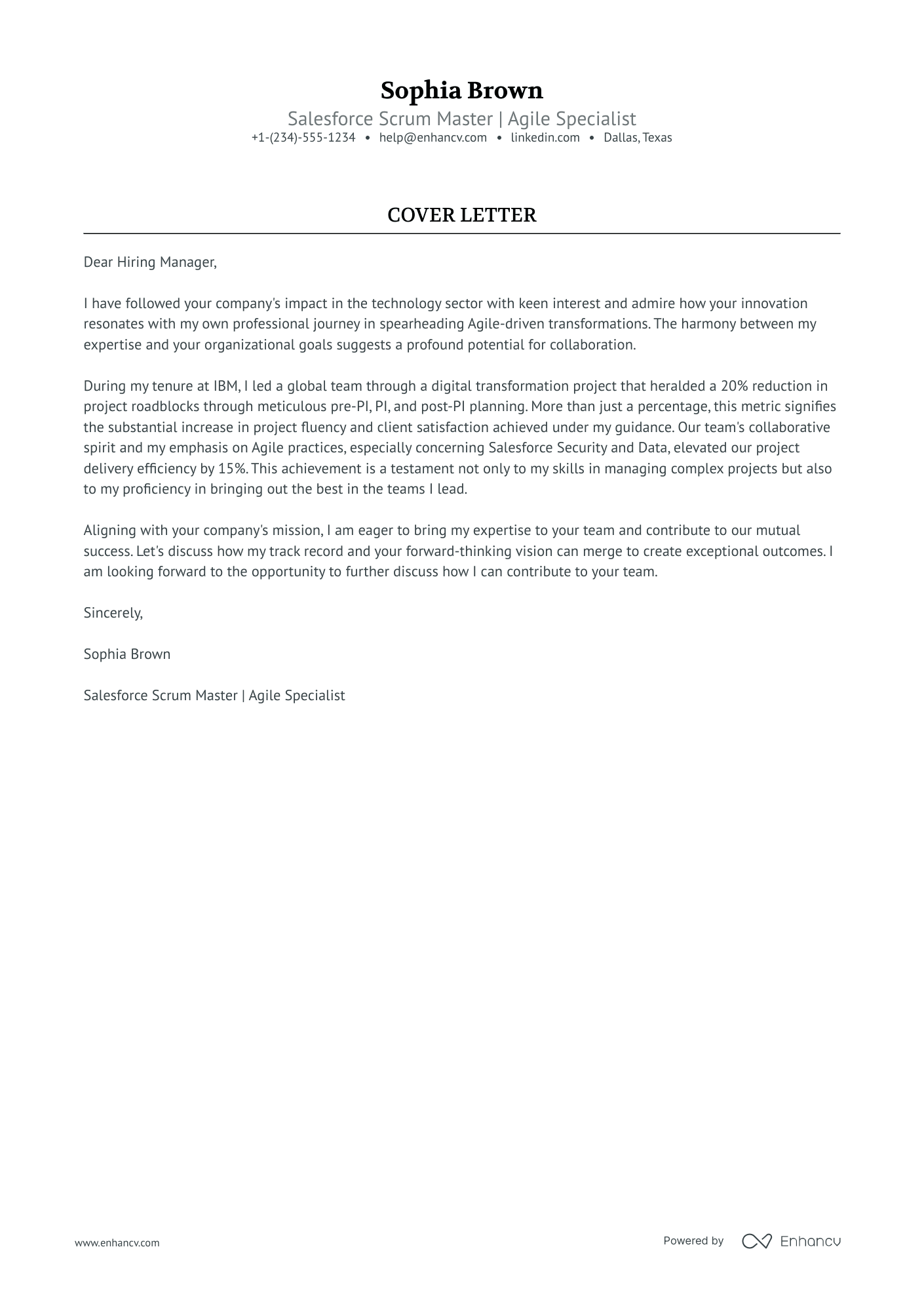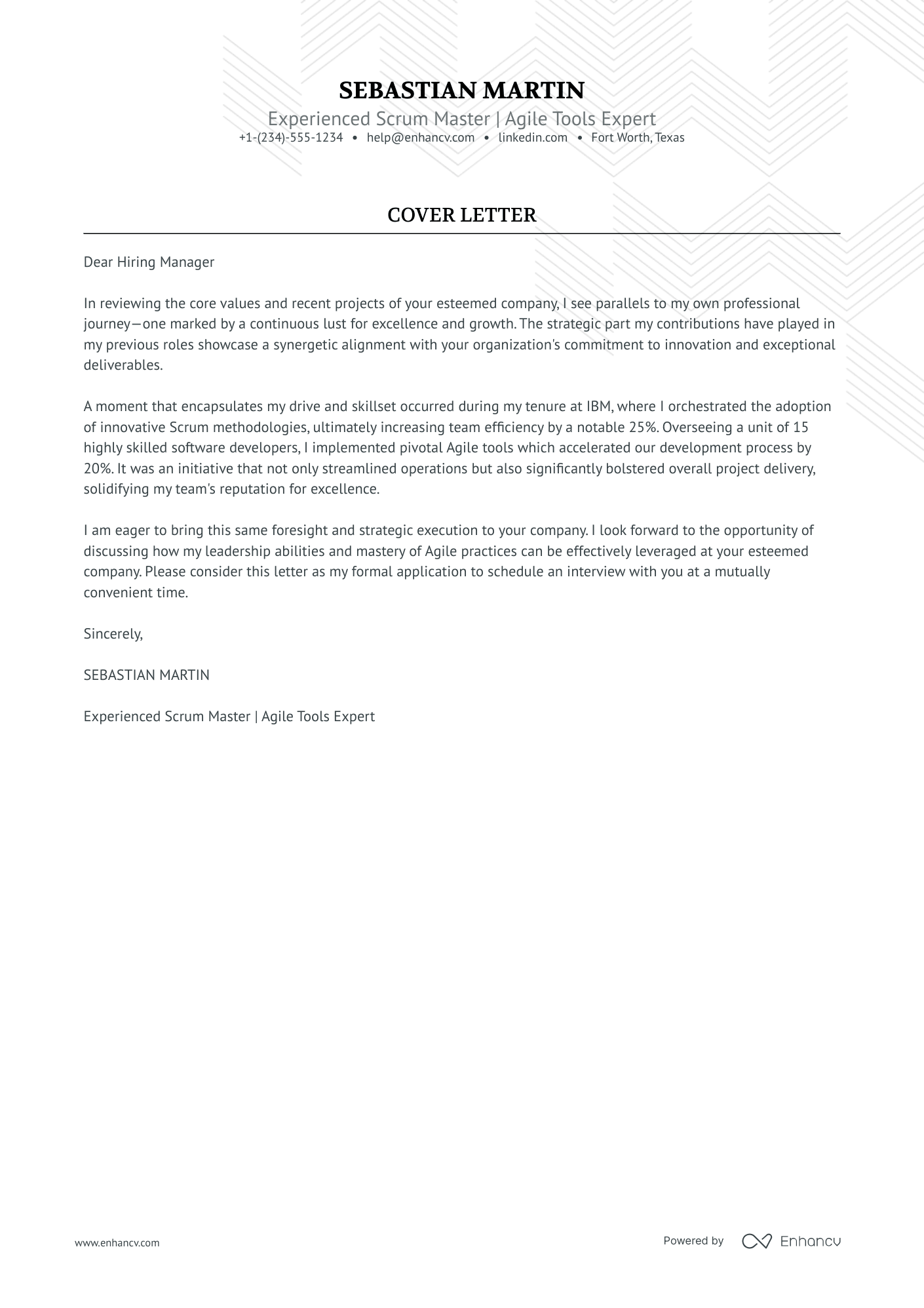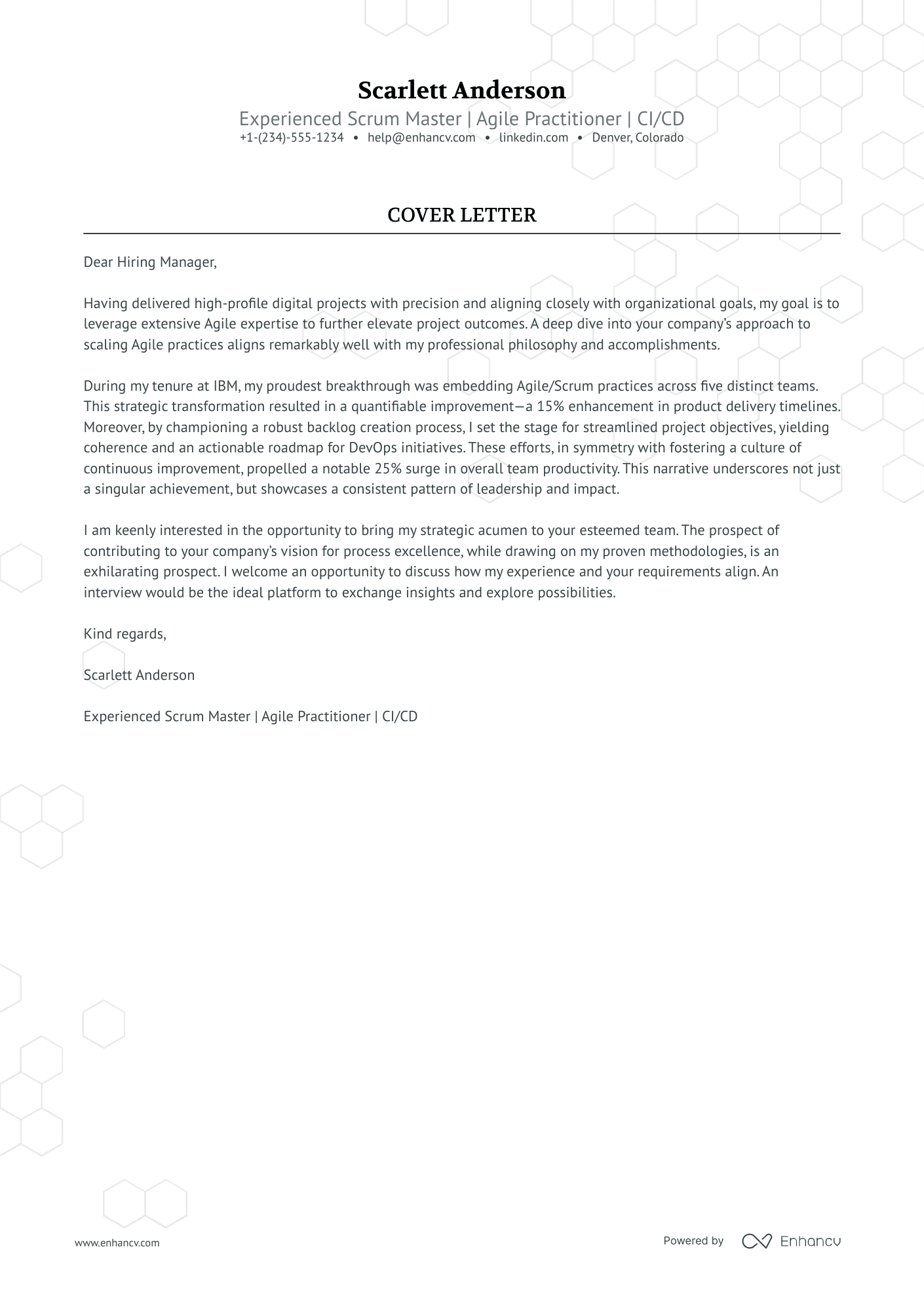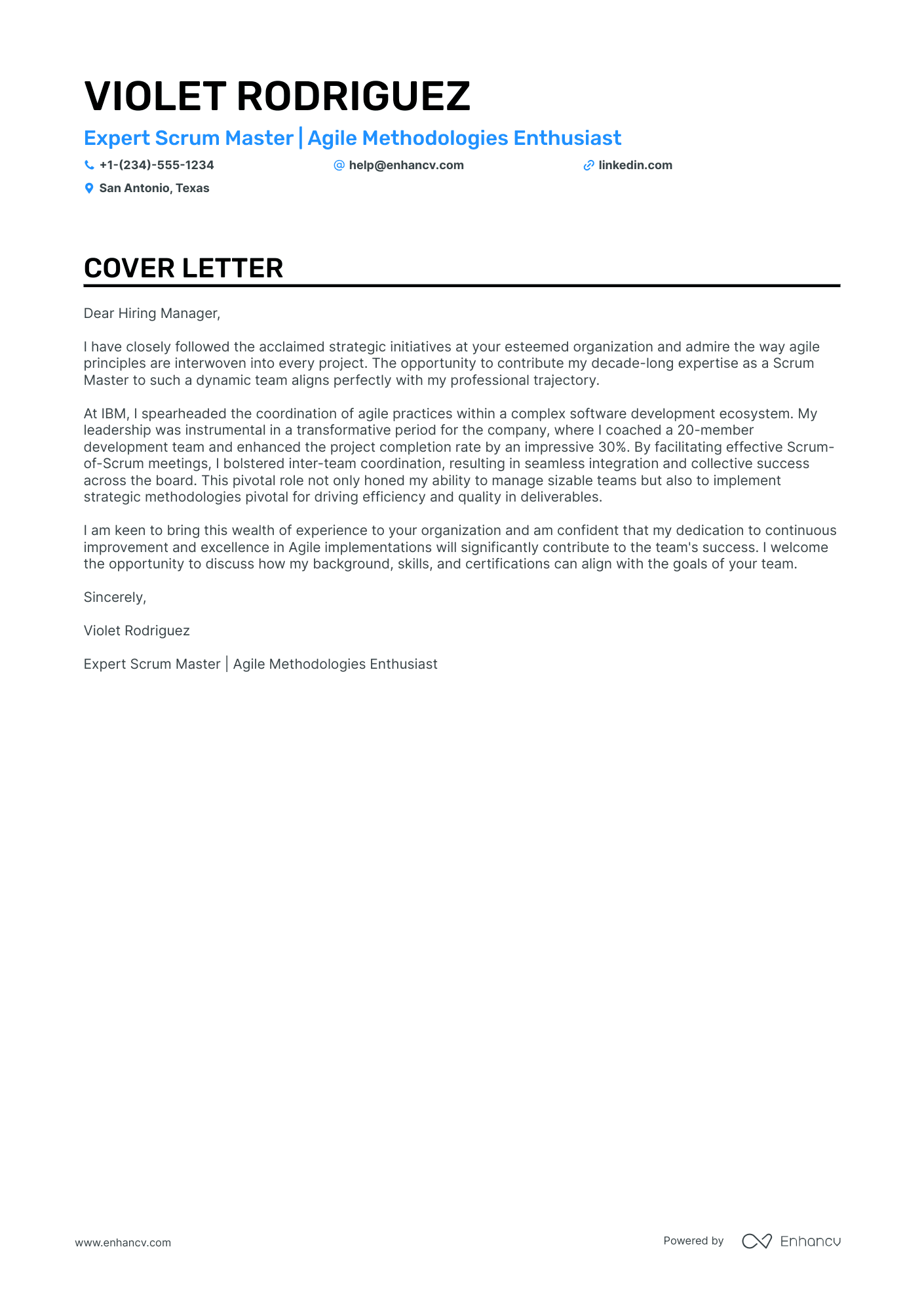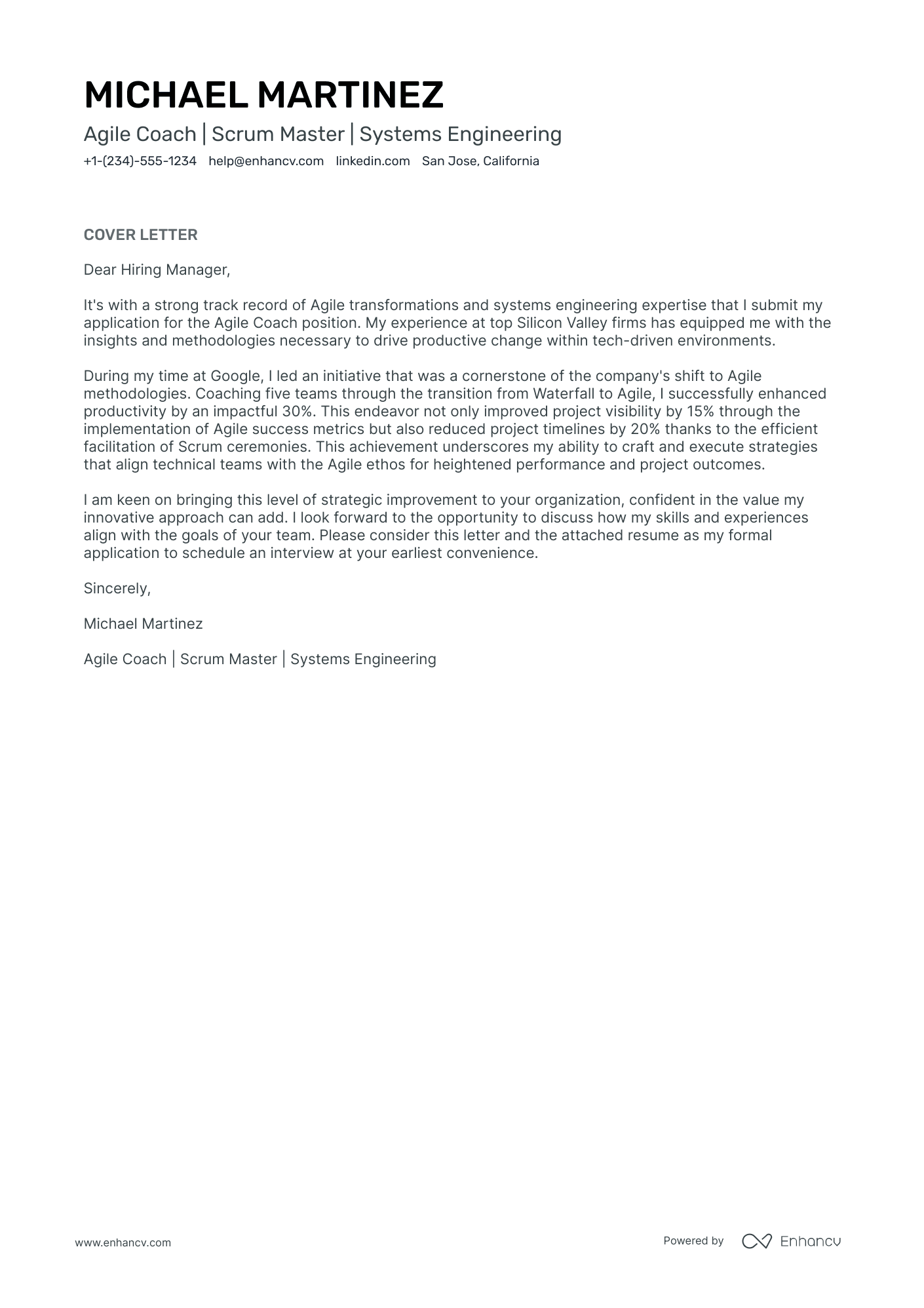Embarking on your job quest, you've quickly learned that a scrum master cover letter is your golden ticket to stand out. But writing one can be daunting—it's not just echoing your resume. Your cover letter should weave a captivating narrative around your crowning professional accomplishment, all while being succinct and steering clear of overused phrases. Remember, conciseness is key; keep it to one page that opens doors to your next career adventure.
- Write a scrum master cover letter that helps you stand out (and get the job);
- Understand how to start and end your scrum master cover letter with the appropriate greeting;
- What to include in the body of your scrum master cover letter to put your best foot forward;
- Your most important achievements - how to present them as part of your scrum master cover letter.
And if you want to make your life even easier, simply drag and drop your scrum master resume into Enhancv's AI cover letter generator, and it will write your cover letter for you in just a few moments.
If the scrum master isn't exactly the one you're looking for we have a plethora of cover letter examples for jobs like this one:
Drop your resume here or choose a file.
PDF & DOCX only. Max 2MB file size.
Scrum master cover letter example
TIMOTHY DUNCAN
New York, NY
+1-(234)-555-1234
help@enhancv.com
- Highlighting certifications relevant to the role such as PMP (Project Management Professional) demonstrates the candidate's commitment to understanding best practice methodologies and indicates readiness for advanced responsibilities in project management, which is crucial for a Scrum Master.
- Emphasizing experience with Agile methodologies shows the candidate’s expertise in a critical skill set necessary for the Scrum Master position, as Agile is often the framework used for project management in IT.
- Quantifying achievements (e.g., "boost their throughput by 15%" and "improved product quality by 17%") provides concrete evidence of the candidate's ability to make a tangible impact, which is persuasive to hiring managers looking to understand the potential value add of the candidate.
- Mentioning experience with specific tactics like paired programming and swarming indicates hands-on experience with tactical approaches that can lead to increased efficiency and collaboration within a project team.
The visual appeal of your scrum master cover letter: format, font, and structure
When using our cover letter builder, make sure to include these vital sections:
- Header (with your name, contact details, the role, and date);
- Greeting (that's personalized to the recruiter);
- Introductory paragraph (to capture attention);
- Body paragraph (to tell a story of how you've obtained your job-crucial skills);
- Closing paragraph (ending with a nod to the future ahead);
- Signature (that is not a must).
Our cover letter templates are already set up for you with the best scrum master cover letter design with single-spaced paragraphs and a one-inch margin.
As for the font of your scrum master cover letter, use the same one as you did in your resume (where modern and simple fonts, like Rubik and Bitter, take precedence over Arial and Times New Roman).
Your scrum master cover letter is created with the recruiters in mind - as no Applicant Tracker System looks over this part of your profile.
When sending over your scrum master cover letter, download it in PDF. This format allows your information and design to stay intact and to keep the same visual quality.
Maximize your efficiency! With our free cover letter generator, you’ll have a great letter in moments.
The top sections on a scrum master cover letter
Header: This section includes your name, contact information, and the date, and is critical for providing the recruiter with easy access to reaching out for an interview.
Greeting: Tailor this to the hiring manager or recruitment team by name if possible, as personalization can help set a positive tone and show attention to detail, which is crucial for a Scrum Master role.
Introduction: Quickly mention your certification and experience in Scrum methodologies, as this will grab the recruiter’s attention and establish your credibility for the Scrum Master position right from the start.
Body: Highlight specific examples of your skills in facilitating scrum ceremonies, coaching teams, and mitigating impediments, as these experiences directly correlate to key Scrum Master responsibilities and showcase your expertise.
Closing: Reiterate your enthusiasm for applying Agile principles and your commitment to continuous improvement, as well as a call to action for an interview, demonstrating your proactive approach which is essential for a successful Scrum Master.
Key qualities recruiters search for in a candidate’s cover letter
- Certified Scrum Master (CSM) accreditation: Demonstrates a formal understanding and commitment to the Scrum framework, which is crucial for guiding teams in agile methodologies.
- Proven experience facilitating Scrum ceremonies: Highlights practical experience and effectiveness in conducting daily stand-ups, sprint planning, reviews, and retrospectives essential for maintaining Agile processes.
- Strong conflict resolution skills: Indicates the ability to navigate team disagreements and obstacles, ensuring a cohesive and productive working environment.
- Experience with Agile coaching: Shows the capability to mentor and elevate a team's understanding and practice of Agile principles, fostering continuous improvement.
- Excellent communication skills: Critical for articulating the Scrum process, clearing impediments, and fostering transparency among the development team, stakeholders, and management.
- Proficiency with Agile project management tools (e.g., JIRA, Confluence): Demonstrates technical competence and efficiency in tracking team progress and facilitating backlog management.
How to start your scrum master cover letter: with a greeting, of course
Have you ever considered just how powerful a personalized salutation can be?
We sure have news for you! Your scrum master cover letter should start with the right salutation to recruiters, nurturing a sense of respect and individuality.
Greet recruiters by using their first name (e.g. "Dear Tom" or "Dear Patricia") if you've previously established contact with them.
Otherwise, opt out for the less familiar, "Dear Ms. Peaches" or "Dear Ms Kelsey", if you've found the recruiter's name on LinkedIn or a corporate website.
"To whom it may concern" is never a good option, as it creates a sense that you've been sending out your scrum master cover letter to anyone. Instead, use "Dear HR team" or "Dear (company name) recruiter" for a feeling of exclusivity.
List of salutations you can use
- Dear Hiring Manager,
- Dear [Company Name] Team,
- Dear [Department Name] Hiring Committee,
- Dear [Job Title] Search Committee,
- Dear [Mr./Ms./Dr.] [Last Name],
- Dear [Full Name of the Hiring Manager],
Get creative with your scrum master cover letter introduction
Recruiters are going to assess plenty of candidate profiles for the role. Thus, anything you do to stand out will win you brownie points.
Use your scrum master cover letter introduction to share something memorable about your experience.
But before you go down the rabbit hole of creativity and humor, align your message with the company culture.
For example, if you are applying for a role in some startup, use those first two sentences to tell a funny story (about your experience) to quickly connect with the recruiter.
How to write an achievement-focused scrum master cover letter body
We've got the intro and greeting covered. Now, comes the most definitive part of your scrum master cover letter - the body.
In the next three to six paragraphs, you'd have to answer why should recruiters hire you.
What better way to do this than by storytelling?
And, no, you don't need a "Once upon a time" or "I started from the bottom and made it to the top" career-climbing format to tell a compelling narrative.
Instead, select up to three most relevant skills for the job and look back on your resume.
Find an achievement, that you're proud of, which has taught you these three job-crucial skills.
Quantify your accomplishment, using metrics, and be succinct in the way you describe it.
The ultimate aim would be to show recruiters how this particular success has built up your experience to become an invaluable candidate.
Time to wrap up your scrum master cover letter
Writing the closing paragraph of your scrum master cover letter is just as important as the salutation.
You have to make it personalized to the job advert and recruiter.
Experienced professionals advise candidates to end with a request or reminder for follow-up. Write that you're grateful for the opportunity, and, at the same time, hint that you're available for the next steps of the process.
Otherwise, you could also conclude your scrum master cover letter by facing the future. How do you see yourself, as part of the team? In particular, how would you settle in your new role in the first six months to a year?
The zero experience scrum master cover letter: shifting the focus to your unique value
Don't worry if you have no conventional professional experience. Within your whole experience, there's plenty more you can write about in your scrum master cover letter.
Take, for example, your biggest achievement or award - dedicate your cover letter body to describe it and the job-relevant skills you've learned.
Your professional ambitions could also take center stage. Describe what you plan on achieving in the next five to ten years and the efforts you're making towards your dreams.
Key takeaways
Summarizing the most important aspects in writing your scrum master cover letter, remember to:
- Create a personalized scrum master cover letter for each role you apply for, that includes the recruiter's name in the salutation;
- Format your scrum master cover letter with single-spacing, one-inch margins, and a modern, yet ATS-friendly font;
- Always start off your scrum master cover letter with two sentences that reflect what is most important about your application;
- Your scrum master cover letter body should feature your biggest accomplishments and the job-relevant skills it has taught you;
- Instead of opting for the "Sincerely yours" ending, close your scrum master cover letter with a nod to the future with what you aim to achieve in this potential role.
Scrum Master cover letter examples
By Experience
Entry-Level Scrum Master
By Role
